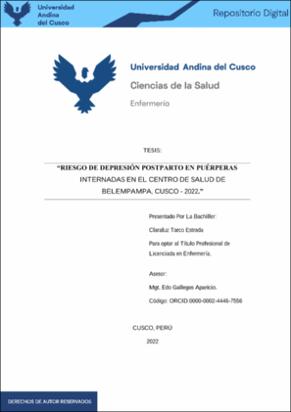| dc.contributor.advisor | Gallegos Aparicio, Edo | |
| dc.contributor.author | Tarco Estrada, Claraluz | |
| dc.date.accessioned | 2023-04-03T23:07:16Z | |
| dc.date.available | 2023-04-03T23:07:16Z | |
| dc.date.issued | 2022-12-29 | |
| dc.identifier.uri | https://hdl.handle.net/20.500.12557/5308 | |
| dc.description.abstract | El objetivo del presente estudio fue determinar el riesgo de depresión postparto en
puérperas internadas, así como describir sus características sociodemográficas y el riesgo
de depresión según dimensiones específicas. Se llevó a cabo un estudio descriptivo,
cuantitativo y de corte transversal con diseño no-experimental. Para la recolección de
datos se utilizó la técnica de la entrevista, con la Escala de Depresión Posparto de
Edimburgo como instrumento. La muestra estuvo compuesta por 136 puérperas que
cumplieron los criterios de inclusión y exclusión.
Los resultados indican que el riesgo de depresión postparto en las puérperas internadas
en el centro de salud de Belempampa es del 10%, mientras que el 28% se encuentra al
límite de presentarla, y un 62% no tiene riesgo de desarrollarla. En cuanto a los datos
sociodemográficos, el 51% tiene entre 26 y 35 años, el 69% tiene secundaria completa,
el 71% son convivientes, el 48% tiene un trabajo independiente, el 57% no planificó su
embarazo, el 100% tuvo de 5 a 6 controles prenatales y el 48% tiene 2 hijos.
Aunque las características sociodemográficas presentan una asociación mínima con la
presencia de depresión postparto, no se evidencian diferencias significativas. Además, se
observó que el 10% de puérperas que presentaron riesgo de depresión y el 28% que
estaban al límite de presentarla no recibieron apoyo ni fueron derivadas a un especialista
porque no fueron diagnosticadas por el personal de salud. Por lo tanto, se recomienda una
mayor capacitación del personal de salud en la identificación y tratamiento de la depresión
postparto para evitar que las mujeres con riesgo no reciban la atención que necesitan. | es_PE |
| dc.description.abstract | The objective of the present study was to determine the risk of postpartum depression in
hospitalized postpartum women, as well as to describe their sociodemographic
characteristics and the risk of depression according to specific dimensions. A descriptive,
quantitative, cross-sectional study with non-experimental design was conducted. The
interview technique was used for data collection, with the Edinburgh Postnatal
Depression Scale as the instrument. The sample consisted of 136 postpartum women who
met the inclusion and exclusion criteria.
The results indicate that the risk of postpartum depression in postpartum women
hospitalized at the Belempampa health center is 10%, while 28% are on the brink of
developing it, and 62% have no risk of developing it. Regarding sociodemographic data,
51% are between 26 and 35 years old, 69% have completed secondary education, 71%
are living with a partner, 48% have an independent job, 57% did not plan their pregnancy,
100% had 5 to 6 prenatal check-ups, and 48% have 2 children.
Although sociodemographic characteristics show a minimal association with the presence
of postpartum depression, no significant differences were found. Additionally, it was
observed that the 10% of postpartum women who were at risk of depression and the 28%
who were on the brink of developing it did not receive support or were not referred to a
specialist because they were not diagnosed by health personnel. Therefore, greater
training of health personnel in the identification and treatment of postpartum depression
is recommended to prevent women at risk from not receiving the necessary care. | en_US |
| dc.format | application/pdf | es_PE |
| dc.language.iso | spa | es_PE |
| dc.publisher | Universidad Andina del Cusco | es_PE |
| dc.rights | info:eu-repo/semantics/restrictedAccess | es_PE |
| dc.rights.uri | https://creativecommons.org/licenses/by-nc-nd/4.0/ | es_PE |
| dc.subject | Depresión postparto | es_PE |
| dc.subject | Puérperas | es_PE |
| dc.subject | Disforia | es_PE |
| dc.subject | Ansiedad | es_PE |
| dc.title | Riesgo de depresión postparto en puérperas internadas en el Centro de Salud de Belempampa, Cusco - 2022 | es_PE |
| dc.type | info:eu-repo/semantics/bachelorThesis | es_PE |
| thesis.degree.name | Licenciada en Enfermería | es_PE |
| thesis.degree.grantor | Universidad Andina del Cusco. Facultad de Ciencias de la Salud | es_PE |
| thesis.degree.discipline | Enfermería | es_PE |
| dc.publisher.country | PE | es_PE |
| dc.subject.ocde | https://purl.org/pe-repo/ocde/ford#3.03.03 | es_PE |
| renati.advisor.dni | 23980669 | |
| renati.advisor.orcid | https://orcid.org/0000-0002-4446-7556 | es_PE |
| renati.author.dni | 73131077 | |
| renati.discipline | 913016 | es_PE |
| renati.juror | Cuba Ambia, Elizabeth Mery | |
| renati.juror | Rojas Pariona, Carmen Rosa | |
| renati.juror | Chihuantito Abal, Luis Alberto | |
| renati.juror | Caballero Aparicio, Sdenka | |
| renati.level | https://purl.org/pe-repo/renati/level#tituloProfesional | es_PE |
| renati.type | https://purl.org/pe-repo/renati/type#tesis | es_PE |



